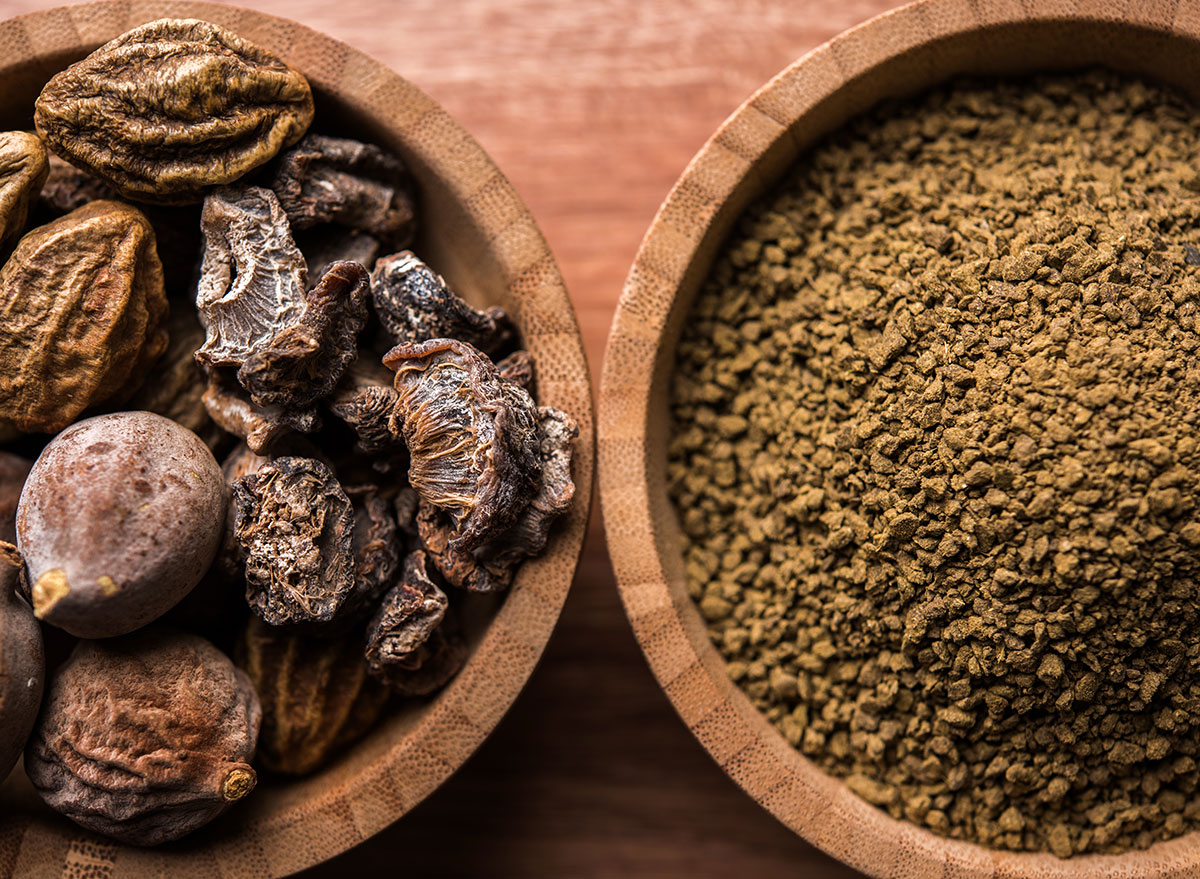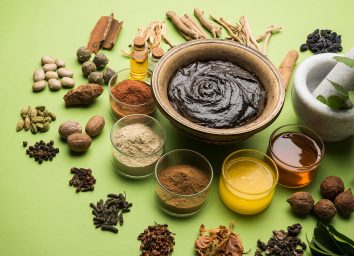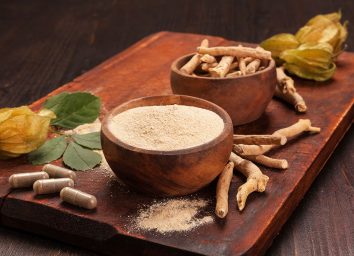What Is Triphala? Know the Truth About This Ayurvedic Anti-Inflammatory Remedy

Ginger ale. Pepto Bismol. Prunes. The BRAT diet. We’ve all got our go-to fixes when our digestive system gets out of whack. But whether you’re dealing with the runs, constipation, or gas, there’s an Ayurvedic fix that may help keep your (in)digestion in check: triphala.
Read on to learn more about the adaptogenic blend, how it supports digestive functioning and overall health, and how to add triphala to your wellness routine.
What is triphala?
Let’s take a peek at that familiar prefix for a minute, ‘tri.’ Triphala is a blend of, you guessed it, three types of fruits—amla, haritaki, and bibhitaki—typically in equal parts. The three fruits are picked, dried, and then made into a powder or packaged into a capsule.
Amanda A. Kostro Miller, RD, LDN, who serves on the advisory board for Smart Healthy Living, explains: “Grouping these herbs together actually creates a synergistic effect, meaning that the herbs are more effective as a trio than they would be individually.” Basically, triphala is The Jonas Brothers of Ayurvedic medicine: the whole is greater than the sum of its parts.
It may support digestive health
In Ayurvedic medicine, triphala is a cornerstone of gastrointestinal health and function—which is also the adaptogen’s most well-studied use. Lisa Richards CNC, nutritionist and founder of The Candida Diet, explains that triphala is used for almost every digestive health issue, including constipation, diarrhea, cramping, gas, and other symptoms associated with IBS.
A 2018 study published in the journal of Chinese Medicine suggests there’s a reason to believe this under-the-radar herb really might be a gut cure-all. The herbal trifecta was shown to regulate the digestive system, with researchers noting that unlike pharmaceutical laxatives, triphala can be used long-term with little side effects.
Triphala may also have antimicrobial properties. According to Dr. Kelly Bay DC, CNS, CDN, “It inhibits the growth of harmful microbes in the gut while promoting the health of beneficial strains such as lactobacillus and bifidobacteria species.”
It is an antioxidant and anti-inflammatory
The benefits of the herb don’t stop in your belly. Triphala is thought to fight inflammation and support immune health, and it has possible anti-cancer properties, Dr. Bay says.
Most of these benefits can be credited to triphala’s high antioxidant content. According to Richards, “These antioxidants protect the body from free radicals, which are thought to damage our cells, and leave us more vulnerable to certain health issues like cancer,” she says.
Antioxidants have also been shown to help the body fight inflammation, says Richards. So there’s a reason to believe that triphala may help reduce the risk of developing chronic inflammatory conditions, she says. While human studies are necessary, animal studies have shown triphala supplementation reduces symptoms of arthritis—which is an inflammatory condition.
It may support your weight loss efforts
Trying to lose weight? Triphala may help, according to Miller. While she says more research is needed, a 2017 review found that those who took a daily dose of the superherb lost more weight than those who did not. However, it’s important to note that “taking triphala is by no means a substitute for a healthy diet that is rich in fiber, probiotics, and whole foods that are rich in antioxidants.”
Potential side effects of triphala
Large doses of triphala can actually worsen digestive woes and cause diarrhea and cramping, according to Richards. So if you’re taking it for relief, you’re going to want to carefully eyeball how much you’re getting.
Another thing to keep in mind is because triphala is an herb, anyone pregnant, nursing, or taking prescription medication should not take it before speaking to their health care provider, she says. That’s because triphala may interfere with the effectiveness of certain medications like antidepressants and blood thinners. “It may even hinder antibiotics, migraine medications, antiarrhythmic drugs, HIV medications, opioids, and more,” Dr. Boyle says.
How to buy and use triphala
Triphala products can be found online or at most health food stores, usually in capsule, extract, or powder form. While it doesn’t have to be taken with a fat, Richards recommends mixing the powdered form with ghee, honey, or butter. And ideally, take it on an empty stomach between meals to increase the absorption.
There is no standardized formula for triphala, which means that there’s a wide range of dosing suggestions. Dr. Bay says, “The amount of triphala recommended depends on what it’s being used for, and can range from 500 milligrams to 4 grams.” So it’s best to follow the dosages/instructions listed on the supplement or to work with an herbalist or an Ayurvedic specialist, she says.
Dr. Bay recommends sourcing your triphala through a practitioner to ensure the quality of the product. The National Center for Complementary and Integrative Health found that one in four Ayurvedic supplements is contaminated with heavy metals such as lead or mercury.
Another option is to buy products that have been certified by a reliable third-party source, such as the U.S. Pharmacopeia, NSF International, or ConsumerLab.com. As Dr. Bay mentions, “although interventions like triphala are natural they still possess mechanisms that must be considered.” Meaning, not all triphala products are necessarily good for you.
Bottom line: Should you try triphala?
Each person’s digestive tract is unique, so while triphala may be the solution for some, it may not be for you—and it could even make your problems worse. That’s why Dr. Bay recommends speaking with a practitioner about your specific health woe and working with them to come up with a regimen customized to your belly and your needs.








